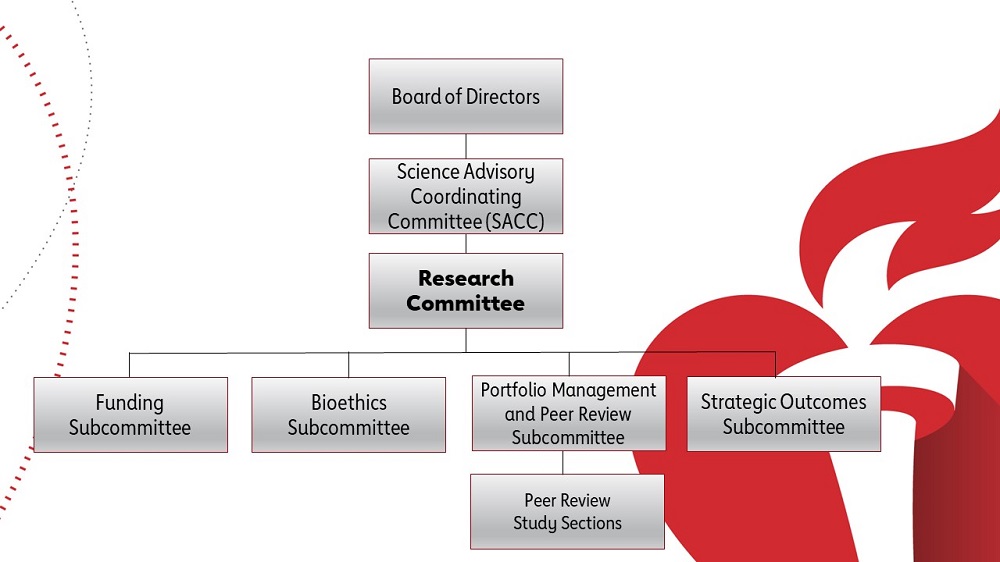Research Volunteer Structure
Science and medicine volunteers establish and direct the American Heart Association's research policies and programs. In partnership with the volunteers, AHA staff provide administrative and implementation support.
The AHA Research Committee and Subcommittees include research volunteers nominated by regional leadership and scientific councils.
The AHA Research Committee oversees and executes strategies to achieve the AHA Research Essential Elements, which include research funding, investigator development, accountability and optimization. Much of this work is done via the subcommittees.
Subcommittees are made up of AHA Research Committee members and other volunteers.

Strategic Outcomes Subcommittee
Bioethics Subcommittee
Portfolio Management & Peer Review Subcommittee
Peer Review Committees (study sections) evaluate the scientific merit of research proposals. Peer Review Committees include volunteer scientists who have experience in biomedical, clinical, population, and translational research. The chairpersons and co-chairpersons of each committee are responsible for recruiting members familiar with the science that will be reviewed. All Peer Review Committees must adhere to association-wide standards established for peer review.
One element of the AHA strategic research direction is the inclusion of Lay Stakeholders in Science and Research in the peer review process. A lay stakeholder may be assigned to assess an application's potential impact on the AHA mission. Lay stakeholders are patients, caregivers, advocates, survivors, family members, or thought leaders without formal training as scientists who have a strong interest in advancing the prevention and/or management of cardiovascular and cerebrovascular diseases and in assisting with the review of American Heart Association research proposals.
2024-25 Research Committee
Chairperson
Svati Shah, MD, MS, MHS, FAHA
Professor of Medicine
Associate Dean for Genomics
Vice-Chief Clinical Translation, Division of Cardiology
Director, Adult Cardiovascular Genetics Clinic
Duke University School of Medicine
Pavan Atluri, MD
Associate Professor of Surgery
Director, Minimally Invasive and Robotic Cardiac Surgery
Director, Cardiac Transplantation and Mechanical Circulatory Assist
Division of Cardiovascular Surgery
Department of Surgery
University of Pennsylvania
Gregory Bix, MD, PhD, FAHA
Director, Clinical Neuroscience Research Center
Director, COVID-19 Biobank and Library at Tulane (COBALT)
Professor and Vice Chair of Research and Academic Affairs, Departments of Neurosurgery and Neurology
Vada Odom Reynolds Chair in Stroke Research
Tulane University School of Medicine
Gerald Bloomfield, MD, MPH, FAHA
Associate Professor with Tenure of Medicine and Global Health
Duke Clinical Research Institute
Khadijah Breathett, MD, MS, FACC, FAHA, FHFSA
Associate Professor of Medicine, Tenured
Division of Cardiovascular Medicine, Cardiovascular Institute
Advanced Heart Failure, Mechanical Circulatory Support and Cardiac Transplantation Team
Indiana University
Todd J. Brinton, MD, FACC
Corporate Vice President, Advanced Technology
Chief Scientific Officer
Edwards Lifesciences
Lisa Cassis, PhD
Professor, Department of Pharmacology and Nutritional Sciences, College of Medicine
Vice President for Research
University of Kentucky
Sunita Dodani, MD, FCPS, MSc, PhD, FAHA
Inaugural Director, Clinical Professor of Medicine
Center 4 Health Research
Department of Internal Medicine
University of Illinois
David C. Goff Jr., MD, PhD, FACP, FAHA
Director, Division of Cardiovascular Sciences
National Heart, Lung, and Blood Institute
Jane Grande-Allen, PhD
Isabel C. Cameron Professor of Bioengineering
Rice University
Bertha Hidalgo, PhD, MPH
Associate Professor of Epidemiology
Ryals School of Public Health
The University of Alabama at Birmingham
Steven Houser, PhD, FAHA
Professor Emeritus, Department of Cardiovascular Sciences
Aging and Cardiovascular Discovery Center
Temple University, Lewis Katz School of Medicine
Walter J. Koroshetz, MD
Director, National Institute of Neurological Disorders and Stroke
National Heart, Lung, and Blood Institute/NINDS
Jane Leopold, MD
Associate Professor of Medicine
Harvard Medical School
Kathleen T. Linta
Caregiver, Advocate
Audrey C. Marshall, MD, MPH
Section Head, Interventional Cardiology
Professor of Paediatric, Temerty Faculty of Medicine
University of Toronto
The Hospital for Sick Children
Frank Scholl, MD, FACS, FACC
Chief, Joe DiMaggio Children’s Heart Institute
Chief of Pediatric and Congenital Cardiac Surgery
Surgical Director of Heart Transplantation
Joe DiMaggio Children’s Hospital
Heather M. Snyder, PhD
Vice President, Medical & Scientific Relations
Alzheimer’s Association
Kristin Newby, MD, MHS, FACC, FAHA
Professor of Medicine, Division of Cardiology
Duke University Medical Center
Heather M. Snyder, PhD
Vice President, Medical & Scientific Relations
Alzheimer’s Association
Clintoria R. Williams, PhD, FAHA
Assistant Professor
Principal Investigator, Kidney PathoPhysiology Research Group Director, Small Animal Physiology Core
Wright State University
Department of Neuroscience, Cell Biology and Physiology
Boonshoft School of Medicine and the College of Science and Mathematics
Joseph Woo, MD, FACS, FACC, FAHA
Norman E. Shumway Professor and Chair, Department of Cardiothoracic Surgery
Professor, by courtesy, Department of Bioengineering, Stanford University
Department of Cardiothoracic Surgery
Stanford University School of Medicine
Bessie Young, MD, MPH, FACP, FASN
Associate Dean, Health Care Equity, School of Medicine
Medical Director, Office of Health Care Equity, UW Medicine
Professor of Medicine, Division of Nephrology, Department of Medicine
University of Washington
Staff Support:
Glenn H. Dillon, PhD
National Vice President, Research and Grants Administration
Office of Research Operations
American Heart Association
7272 Greenville Ave.
Dallas, TX 75231
[email protected]